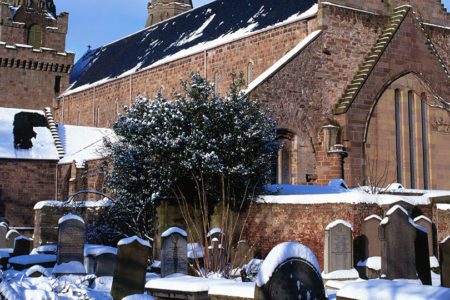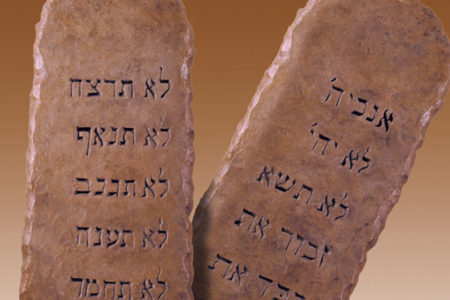Israel’s Wickedness Removed
Zechariah 5:1–11
Zechariah’s first five visions greatly encouraged and comforted the Jewish remnant returning from Babylon. They revealed that the Lord would return to Jerusalem with mercy, give Israel victory over its enemies, reestablish and enlarge Jerusalem, purify and reinstate Israel’s high priest, and assure completion of the Temple.
However, the last three visions in this series take an abrupt turn. Instead of foretelling blessing, they sternly warned against wickedness. Before Israel could experience the blessings mentioned above, the land of Israel had to be purged from individual and national wickedness. Two of the last three visions are recorded in this chapter and address the issue of individual and national wickedness within the nation of Israel.
The Sixth Vision
A sixth vision was revealed to Zechariah as he contemplated his previous visions:
Then I turned and raised my eyes, and saw there a flying scroll. And he said to me, “What do you see?” So I answered, “I see a flying scroll. Its length is twenty cubits and its width ten cubits” (vv. 1–2).
What the prophet saw was a huge, unrolled scroll, 30 feet long and 15 feet wide, flying swiftly through the sky like a long banner, inscribed with God’s Law on each side. Commentators compare the scroll’s size to the holy place in the Tabernacle (Ex. 26:15–25) and the porch of Solomon’s Temple (1 Ki. 6:3). But no comparison is alluded to in the text.
The angel told Zechariah what the flying scroll represented:
This is the curse that goes out over the face of the whole earth: “Every thief shall be expelled,” according to this side of the scroll; and, “Every perjurer shall be expelled,” according to that side of it (v. 3).
The “curse” was a message of judgment addressed to Israel and destined to fall on all who broke the commandments.
Leviticus 26 and Deuteronomy 28 are often called the blessing and cursing chapters of the Mosaic law. There Moses set forth the blessings the Israelites would experience by obeying God’s commandments (lev. 26:1–13; Dt. 28:1–14) and the curses that would befall them if they disobeyed (lev. 26:14–46; Dt. 28:15–68).
In this context, God’s curse will fall on “every thief…and, every perjurer” (v. 3). In other words, those who break the eighth commandment (ex. 20:15) by stealing and those who break the third commandment by swearing falsely in God’s name (ex. 20:7) will be “expelled” (v. 3), or rooted out and removed from Israel.
Notice that in the Ten Command -ments, swearing falsely is a sin against God, mentioned in the middle of the first tablet of five commandments; and stealing is a sin against men, mentioned in the middle of the second tablet. The first is a sin against the holiness of God, and the second is a sin against one’s neighbor. God probably chose these two commandments because they represented sins against both God and man at that time.
Those who break God’s law will not be able to hide from His curse or escape His judgment. Zechariah continued,
“I will send out the curse,” says the Lᴏʀᴅ of hosts; “It shall enter the house of the thief and the house of the one who swears falsely by My name. It shall remain [literally, “take up lodging”] in the midst of his house And consume it, with its timber and stones” (v. 4).
God’s curse moves throughout the households of Israel, looking to apprehend offenders. When an offender is found, he will be judged surely, swiftly, and severely. Even the offender’s dwelling will be destroyed. The curse spends the night in the house of the guilty party, consuming the materials the house was built with—the timber and stone. This metaphor is reminiscent of the fire sent down from heaven on the prophet Elijah’s altar. It consumed the offering, wood, stones, dust, and water (1 Ki. 18:38).
The message in this sixth vision is that God will judge all persistent wickedness committed by the returning remnant. No Israelites will be able to conceal their sin or escape God’s retribution. sin will ruin the individuals and their families, especially those who steal and swear falsely. God’s judgment will abide on both the house and family of all who commit wicked-ness until they are totally destroyed.
The Seventh Vision
In verse 5, the interpreting angel instructed Zechariah to lift up his eyes and identify something. Unable to identify what he saw, Zechariah answered, “What is it?” (v. 6).
The angel replied,
“It is a basket [ephah] that is going forth.” He also said, “This is their resemblance [literally, “eye” or “appearance”] throughout the earth: Here is a lead disc [talent] lifted up, and this is a woman sitting inside the basket”; then he said, “This is Wickedness!” And he thrust her down into the basket, and threw the lead cover over its mouth (vv. 6–8).
In the sixth vision, Zechariah learned that God would permanently eradicate all wicked individuals from the land. Vision seven goes a step further and pictures God permanently eradicating all wickedness from Israel.
The “basket” (Hebrew, ephah) mentioned in verse 6 was a large measuring container, slightly larger than a bushel, which could hold 10 omers (Ex. 16:36), or approximately five gallons of dry material. The text does not say what the basket represents, but many interpreters teach that it symbolizes commercialism or trade being carried on in Israel.
The Judeans were an agrarian people before their captivity in Babylon; but while in exile, say some interpreters, they learned commerce and became astute businessmen. The generation born in Babylon then picked up a spirit of secularism with a desire for material gain; and upon returning to the land, they brought these sinful practices with them. Scripture clearly shows that such practices were manifested among the returnees (Neh. 5:1–13; Mal. 3:8–9).
These interpreters believe the text further supports their position when it says, “This [the basket] is their [the Jewish people’s] resemblance [eye or appearance] throughout the earth [or land]” (v. 6). That is, resemblance or eye represents the returnees’ insatiable self-centered look and desire for material gain through wicked practices learned in Babylon.
Such an interpretation reads into the text a depiction of the returnees that is not taught in vision seven. Thus it is best to interpret this vision as a general banishment of wickedness from Israel, rather than as a caricature of the returnees.
Next, the angel lifted the round covering from the basket to reveal a “woman sitting inside” (v. 7). she is identified as “Wickedness” (v. 8), that is, the personification of wickedness that was being manifested throughout the land of Israel.
Evidently the woman tried to escape her confinement, but the angel “thrust her down [violently hurled her back] into the basket, and threw the lead cover over its mouth” (v. 8). The woman’s incarceration limited her activities, preventing her from spreading further evil throughout Israel until she could finally be removed from the land.
The ultimate removal of wickedness in Israel, and in the world, will take place before Christ’s Millennial reign. In that day, wickedness will not be manifested because Satan will be chained in the bottomless pit, unable to roam the earth and tempt men to do evil (Rev. 20:1–3); and Christ will rule Earth with a “rod of iron” (Ps. 2:8–9; Rev. 19:15).
Again Zechariah looked up. This time he saw “two women, coming with the wind in their wings; for they had wings like the wings of a stork, and they lifted up the basket between earth and heaven” (v. 9). The women are described as having wings like a stork. storks are migratory birds whose wings are large, broad, strong, and able to carry the Stork for a long time over great distances without tiring. The word stork in Hebrew means “faithful one.” The wind assisted the women as they swiftly and faithfully removed the basket of wickedness from the land of Israel and flew it to a chosen destination.
Some identify these women as Satan’s demonic agents seeking to remove the woman of wickedness from God’s judgment in Israel. They fly the woman to Babylon and enshrine her there to be worshiped during the Great Tribulation.
Others identify the women as God’s agents removing wickedness from Israel. There is no hint in the text as to the women’s identity, but the second view seems more plausible. As the bas-ket is lifted off the ground and flown away, Zechariah asks, “Where are they carrying the basket?” (v. 10).
The interpreting angel informed the prophet, “To build a house [abode] for it in the land of Shinar [Babylon]; when it is ready, the basket will be set there on its base” (v. 11). Wickedness is to be removed from Israel and returned to Babylon, where it originated. some teach that, after the basket is firmly on its base, the woman inside is worshiped as an idol; but nothing in verse 11 leads to this conclusion or justifies this interpretation.
Shinar is where the cities of Babel, Erech, Accad, and Calneh were located (Gen. 10:10; 11:2). In Babel, under the guidance of Nimrod, the people said, “Come, let us build ourselves a city, and a tower whose top is in the heavens; let us make a name for ourselves, lest we be scattered abroad over the face of the whole earth” (Gen. 11:4). This activity was in disobedience to God, who instructed Noah and his descendants after they left the ark, “fill the [whole] earth” (Gen. 9:1).
In open rebellion to God’s command, the people built a tower and placed a temple at its top. Their rebellion manifested itself in unity, strength, and pride as they developed a pagan religious system. In response, God confounded their language and scattered them over the face of the earth, which ended the construction on the city of Babel.
But the people did not cease their idolatry. They spread their religious practices across the earth, and the ungodly beliefs of many religions today can be traced to the idolatry of Babylon.
How will the wickedness mentioned throughout chapter 5 relate to Babylon in the future? This wicked religious and commercial system will again flourish during the Great Tribulation in a rebuilt Babylon as described in Revelation 17 and 18. Babylon’s diabolical religious system, personified by a woman carried by the beast (Antichrist), will be destroyed by ten “horns” (kings) that give total allegiance to the Antichrist (Rev. 17:7, 16).
Immediately prior to Christ’s Second Coming, rebuilt Babylon, with its extensive commercial center, will be suddenly and swiftly destroyed (Rev. 18:2, 18, 21). Afterward, all wickedness will be removed from the earth in preparation for Christ’s Millennial rule. What a day of glory that will be for both Israel and the world!






